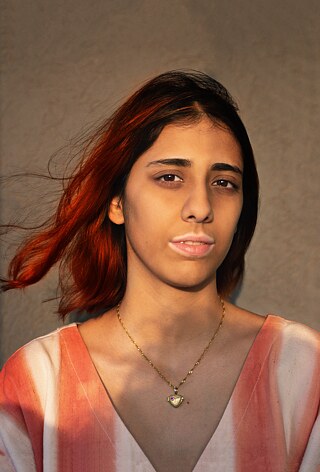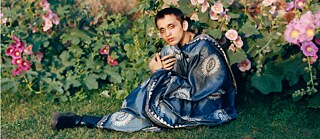Prismer Taxx, Shreya Josh “To enjoy is a form of resilience”

How do you create a safe space to party and feel good in New Delhi? DJ Prismer Traxx and tattooist and artist Shreya Josh talk about their contribution to the metropolis’ nightlife in an interview.
Since the end of the pandemic, there's been a party series in Delhi that adds a layer of complexity to the humdrum rave: “Mixed Feelings” creates a safe space. DJ Prismer Taxx, who started Mixed Feelings, and his wife, tattooist and artist Shreya Josh, create an environment where people can do what they want to do, which is not necessarily the case in a city that’s considered one of the most unsafe cities for women in the world, and in a country where a right-wing nationalist party has been in power for ten years and where the law (introduced by the British colonial power), Article 377, which criminalises homosexuality, was abolished in 2018, but where queer people continue to suffer various forms of repression. Something that sometimes seems so natural to us in our Berlin bubble: simply going out to party and feeling good about it, without fear for your own physical or mental integrity. Shreya's “Paradise Tender” studio, where she offers stick and poke tattoos and tooth gems, is more than just another cool scene beauty thing in this context. Her art helps people to develop and express their individuality. We really want to get to know these two, so despite our jet-lagged, sleepless nights, we hop in a taxi and head to “Summer House”, one of the few independent and oldest clubs in Delhi (most of them belong to larger hotels), and are promptly invited to Shreya's birthday party in a fortnight's time and to their home. So we drink whiskey on ice on the roof terrace. Shreya's studio is in the basement of the house.S: Shreya Josh
P: Prismer Taxx
K: Katharina Holzmann
K: When did you guys meet?
S: I Imagine 2017, 2018. We were just acquaintances. We met while clubbing at Summer House.
K: So Summer House is one of the only clubs in Delhi, where you can really rave?
P: Before Summerhouse there were only one or two clubs that were playing Techno, but it was very lowkey and you couldn’t really dance. It’s a society thing I think. Now people are more open. I mean, there were clubs but it was a different kind of scene. There was one club which actually was run by this DJ Rami Sharma who is now based in Berlin. He used to run this club and he used to just make us clap. I was 14, 15. That’s how I started to get into clubbing. So when I went to London to study guitar, a lot of the people were all into electronic music, right? So, yeah, then I realized I can just be out for 10 hours, 12 hours and dance. I met some Italians and we started going to some gigs together and they were DJs. They taught me a little bit and then we started just doing parties in our house. I got into it. It was fun. Then once I came back I just kept DJing. I really enjoyed it and it was also quite alive here at the time and it was building. And Summer House and Auro are like the only clubs for this kind of music. In terms of music and the audience that you get it’s the most open in Delhi.
It was fun.
K: So you are into clubbing for quite some time – were you already tattooing when you guys met, Shreya? You do mostly Stick N Poke, right?
S: Yeah, I just started about then, in 2017. Now I do basically all my line work with the machine. This is so much faster. But all the shading and the coloring inside I still do with the Stick N Poke, because it gives that textured effect.
K: It’s more like a painting or something.
S: Yeah, exactly. I primarily studied painting in college in Chicago. That’s when I first got introduced to Stick N Poke. Before that I had gotten a few tattoos when I was in high school. But those tattoo artists were working so fast, they were professionals. So they did the design and I was out. So for me, tattoos weren’t like an artistic experience. It was more like you go and get something, like a service. And then in college, when I saw Stick N Poke as something you just can do on your friend, my mind was blown. I was like, oh, you don’t have to take it so seriously. You don’t have to put so much meaning into it. You don’t have to take care of your body so much.

Shreya Josh | Photo: Amelie Kahn-Ackermann
S: I have helped a lot to build that without sounding egoistic. But there was a big tattoo scene where there were big commercial studios. You know, they weren’t like artists with defying styles. They knew how to copy anything. But with the Stick N Poke scene it was different. I was also part of building a flash tattoo culture in India, which was not a thing up until then. So when I started out with Stick N Poke, I also started teaching workshops. And it’s not like I knew enough about the art form, but I knew enough of the hygiene aspect and how deep you need to poke in. A lot of college girls were really interested in learning. Because then for them also it was the same thing, they wanted to tattoo their college mates, and then even just make pocket money, or you know, barter, like, I’ll give you a tattoo, you buy me alcohol on the weekend, because college kids – they’re all broke. So it’s like instantly, people were more interested, honestly, to learn, than to even get one.
I dedicated myself to tattoos for I think like 4 years very solidly.
Which is the same that I’m experiencing with “Truth Gems” now. There’s people who ask me for workshops but they don’t wanna get one, which I find very interesting. But yeah, with the workshops that I was teaching, they were tattooing themselves in the classes. And then I did that in Delhi, Bombay, Bangalore because those were the three big cities and I think by now I’ve taught like over 600–700 people all over India – including the workshops. I realized I want to build this whole culture in India. I dedicated myself to tattoos for I think like 4 years very solidly. But in the last 2 years, I started to realize that I want to grow as an artist much more. And in India, it’s really hard to do that because the flash culture is still very very limited. So, it’s not like I have clients coming in every day or every week. I want to turn tattooing into more of a barter thing in the future and trade with other tattoo artists rather than making it my main source of financial income. I am going back more towards painting and illustrating and things like that. And selling it more as merch or as big canvas. Because people will buy the same illustrations on a t-shirt, rather than having them on their skin right now.
K: Is it hard to make a proper life out of DJing and tattooing here? Or is it, at the end of the day, a struggle? Because I can imagine even if the scene is growing it is still small …
P: Yeah, I mean being an artist anywhere in the world I think there is a certain amount of privilege that you have to have, because otherwise you cannot sustain yourself, at least at the beginning. I obviously have certain privileges because I stay with my family so I don’t need to pay rent and stuff. But in India it’s normal to stay with your parents even after you got married.
S: There are so many talented people all around India, but a lot of them don’t get the same opportunity because they need to provide for their daily living. So they aren’t able to put in as much time into their creative practice.
There are so many talented people all around India, but a lot of them don’t get the same opportunity.
S: But also for me, I feel like that, with the privilege that I have, I also want to make sure that I don’t misuse it to a certain extent. That’s why a lot of times when I get these requests, I just move them on to other artists I know, who would be happy to take this kind of a job. So for me, I don’t want to take up space when I don’t need to.
P: Yeah, I mean, same here. I feel like because I’ve been given this position, I try to help out other people when we do parties. I’m always trying to book people who I think deserve to get booked, but are just not because they’re introverts or don’t have enough followers or something.
S: It is changing in newer generations for sure but the older generation they do set in their ways. They still judge you if you’re in a certain caste and they do try to keep it in that practice because they pay people a certain way just to make sure they stay in the same place they were. It’s not like their income increases enough for them to ever be able to grow out of that. It’s enough to sustain them there. But in our generation, I think India is becoming very politically opinionated and politically woke. But it will take too much time to break down the institutional law. In terms of what we can do from person to person: many of us try not to see what caste or what religion someone is from. And the queer community in India is very strong.

Shreya Josh | Photo: Amelie Kahn-Ackermann
S: Yeah, same as in India.
K: Feels like it’s worldwide now. Makes you afraid a bit.
S: Yeah, it does. But it depends on how much you can speak up about this stuff. Because even that, in India, it’s hard to do it. The government controls the media, basically.
P: Most journalists who actually speak the truth are in jail. The universities now are the strongest left field you would ever experience in India. And they are very vocal, they protest about stuff, but then they get beat up. These kids are resilient, I don’t know how they do it.
P: Yeah, any changes that happen, any movement, any protest, it all starts in all the colleges. Their foundations are strong because it was built upon professors and teachers who were open and they understood what India is. Because if you go somewhere else in India, you go to Shillong, it’s a completely different culture, structure, it’s a matriarchal society. So everything is different. Like the way men behave is totally different.
Any changes that happen, any movement, any protest, it all starts in all the colleges.
S: This could sound very naive to some people, but for a lot of this, a form of resilience is also to enjoy. The whole country is out there, these are the people who don’t have the right to exist or don’t have the right to enjoy. And we provide them with a safe space like in my studio where it’s primarily queer and feminist people. So they have a safe space where they can come and express themselves. Or also on Prisma’s dance floors where they can come and dance and be themselves – that is our form of protest.
P: And it’s pure, it’s pure because it’s very human whatever you’re feeling, because you’re doing something for yourself and someone is really allowing it. When you’re told you’re not allowed to do this, allowed to do that, don’t be this way, don’t dress like this … But we really do have a very beautiful, colorful crowd. Thank the universe, or whatever.
S: Yeah, like people are making out on his dance floor. Which is not common in India. At his parties you see these 20-year old boys with massive hickeys.


